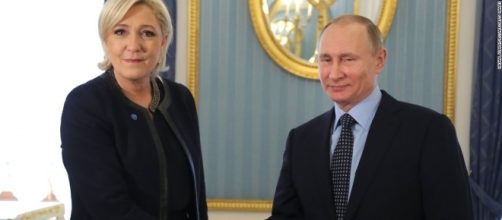With billionaire Donald Trump winning the U.S. presidential election in the same year that the far-right successfully voted for Brexit in the U.K., far-right politicians are finding they have more reason to use the same tactics that Trump and the politicians driving the Brexit vote used to win. One of them is the public proclamation of their support for Russian president Vladimir Putin, just as Donald Trump did during his campaign when he said that he admired the Russian President. For Trump, his "love" for Putin has resulted in an investigation against him to learn what involvement the Trump campaign had with the Russian government.
On Monday, the intelligence community confirmed that there is evidence the Russians were involved in the hacking of the Democratic National Committee network last year, stealing emails which were used for political ammo against Democratic candidate Hillary Clinton. But they also confirmed that there was an investigation on President Trump and his aides, possibly colluding with Russian officials. What is also apparent, however, should nothing comes out of the investigation, is at the very least for the far-right, it appears to be a good political promotion tool which French nationalist Marine Le Pen has been using for her election campaign. She has said that she admires Putin so much that on Friday, she was given an audience at the Kremlin, hosted by the KGB-made Russian leader himself.
Crippling sanctions against Russia
France's far-right presidential candidate Marine Le Pen urges an end to the EU sanctions imposed on Russia https://t.co/kk2XXFaDT0 pic.twitter.com/HxrgAe1Nj9
— Press TV (@PressTV) March 24, 2017
Reports on her visit highlight that she supports the lifting of sanctions against Russia. Before the rise of the far-right in politics, it was largely agreed that in order for countries to be pressured, politically was to impose sanctions on them.
This has been done to North Korea, Cuba and Russia to name three. But it's been said that the sanctions imposed on Russia have stressed the economy so much that Putin has an interest in getting those sanctions lifted. One of the central reasons as to why "crippling" sanctions have been imposed on them is due to the situation in the Ukraine.
After the Median uprising in 2014 ousting a Putin-endorsed President, Putin annexed the port city of Crimea and established an autonomous region in the East using Russian separatists who are constantly shelling Ukrainian soldiers.
Russian interference in French election
‘It’s now the world of Putin, the world of Donald Trump,’ says France’s far-right leader Marine Le Pen https://t.co/VcKspeDBjf pic.twitter.com/6yh9q8tm0G
— Raw Story (@RawStory) March 24, 2017
While Marine Le Pen was at the Kremlin, according to Reuters, Putin said that he was interested in developing a better relationship with France but also acknowledged "that Le Pen represented a range of political forces that was gaining momentum." This is also the case with the United States where many believe Donald Trump will use his loyalty to Putin to try to have sanctions lifted.
This was also at the center of Trump's Russian scandal in February when it was learned that President Trump's national security advisor Michael Flynn had been talking with Russian officials about lifting those sanctions. The reports suggested that Flynn told the Russian officials he was speaking with in December and around the same time that President Obama put new sanctions on Russia, to wait until Trump got into office before they would start working to lift them.
Le Pen's opponent Emmanuel Macron has said of Le Pen that she has a sick fascination with Russia. Its been revealed that in 2014, Le Pen benefitted financially with accepting money from a Russian bank. She and the Kremlin deny that she is getting financial help for her current campaign but, the Kremlin has also denied that they are flooding international media with fake news.
Even with this, Putin said that they have a right to present their view to other countries as other countries do to each other and that they are not intentionally trying to influence others. Its been said that Le Pen's family has a long history of support for Russia but that it's doubtful they will have much influence on French mainstream media. Social media, however, is still fair game.

